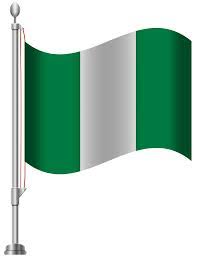
By Jennifer Imarhiagbe
Every country is identified by her national flag which is commonly a Primary symbol.
Nigeria is not an exception as her flag consisting of two colours with equal horizontal stripes of green, white, and green is the nation’s pride and symbol of unity, peace, love, and togetherness.
In the Nigerian flag, the green represents the country’s the fertile lands, natural wealth, and agriculture, while the white stripe on the other hand represents peace and unity.
The symbolism embedded within the Nigerian flag is deeply rooted in Nigeria’s history and the aspirations of its people.
The green colour which embodies Nigeria’s agricultural abundance has been a key driver of her economy and it also represents the country’s opulent vegetation and natural resources. Recognizing this symbolism is crucial in understanding the role of the Nigerian flag in fostering patriotism and unity among her citizens.
The history of the Nigerian flag dates to October 1, 1960, when the country gained independence from British colonial rule.
The design of the flag was the result of a nationwide competition held in 1959, which sought to create a unique and representative symbol for the newly independent nation.
The winning design was by MICHAEL Taiwo Akinkunmi, a 23-year-old student, and has since been officially adopted as the nation’s national flag. With over 250 ethnic groups and multiple languages spoken, fostering national unity is essential.
The Nigerian flag serves as a powerful unifying force, transcending these differences and reminding citizens that they are all part of one nation.
It promotes a sense of belonging and encourages citizens to set aside their differences and work together for the common good of the country.
The Nigerian flag is a powerful symbol of national identity and patriotism, it is not just a piece of cloth with colors.
Its design and symbolism reflect Nigeria’s history, values, and aspirations.
The flag serves as a constant reminder of the struggles for independence, a unifying force for the diverse ethnic groups, and a source of inspiration for the future.
It represents the hopes and dreams of the Nigerian people, and it is a symbol of their resilience and determination.
The flag of Nigeria has been used to foster patriotism in various ways. It is often used in school curricula to teach children about the history and culture of Nigeria.
It is also used in government institutions to promote national unity and pride. In addition, the flag is often used by political leaders to rally support for their causes.
It has been flown by protesters fighting for democracy and human rights.
It has also been flown by athletes competing at international sporting events and other National celebrations.
Another way to create a more patriotic generation is by parents teaching children about the meaning of the flag and by encouraging them to display it proudly.
Due to the importance of flag to the unity of any nation, it is therefore necessary to understand that it should be treated with utmost care, respect as well as be replaced as soon as it becomes frayed.
It is worthy to note that it is illegal to burn the Nigerian flag, because it could damage Nigeria’s image in the global community.
As the flag is seen as a symbol of hope for a better future, it is therefore pertinent for citizens to understand that it is a reminder that Nigerians can overcome any challenge if they stand together.
Edited By Grace Namiji



Commentary
Significance Of The Nigerian Flag In Fostering Unity, Patriotism
todayOctober 7, 2023 30
By Jennifer Imarhiagbe
Every country is identified by her national flag which is commonly a Primary symbol.
Nigeria is not an exception as her flag consisting of two colours with equal horizontal stripes of green, white, and green is the nation’s pride and symbol of unity, peace, love, and togetherness.
In the Nigerian flag, the green represents the country’s the fertile lands, natural wealth, and agriculture, while the white stripe on the other hand represents peace and unity.
The symbolism embedded within the Nigerian flag is deeply rooted in Nigeria’s history and the aspirations of its people.
The green colour which embodies Nigeria’s agricultural abundance has been a key driver of her economy and it also represents the country’s opulent vegetation and natural resources. Recognizing this symbolism is crucial in understanding the role of the Nigerian flag in fostering patriotism and unity among her citizens.
The history of the Nigerian flag dates to October 1, 1960, when the country gained independence from British colonial rule.
The design of the flag was the result of a nationwide competition held in 1959, which sought to create a unique and representative symbol for the newly independent nation.
The winning design was by MICHAEL Taiwo Akinkunmi, a 23-year-old student, and has since been officially adopted as the nation’s national flag. With over 250 ethnic groups and multiple languages spoken, fostering national unity is essential.
The Nigerian flag serves as a powerful unifying force, transcending these differences and reminding citizens that they are all part of one nation.
It promotes a sense of belonging and encourages citizens to set aside their differences and work together for the common good of the country.
The Nigerian flag is a powerful symbol of national identity and patriotism, it is not just a piece of cloth with colors.
Its design and symbolism reflect Nigeria’s history, values, and aspirations.
The flag serves as a constant reminder of the struggles for independence, a unifying force for the diverse ethnic groups, and a source of inspiration for the future.
It represents the hopes and dreams of the Nigerian people, and it is a symbol of their resilience and determination.
The flag of Nigeria has been used to foster patriotism in various ways. It is often used in school curricula to teach children about the history and culture of Nigeria.
It is also used in government institutions to promote national unity and pride. In addition, the flag is often used by political leaders to rally support for their causes.
It has been flown by protesters fighting for democracy and human rights.
It has also been flown by athletes competing at international sporting events and other National celebrations.
Another way to create a more patriotic generation is by parents teaching children about the meaning of the flag and by encouraging them to display it proudly.
Due to the importance of flag to the unity of any nation, it is therefore necessary to understand that it should be treated with utmost care, respect as well as be replaced as soon as it becomes frayed.
It is worthy to note that it is illegal to burn the Nigerian flag, because it could damage Nigeria’s image in the global community.
As the flag is seen as a symbol of hope for a better future, it is therefore pertinent for citizens to understand that it is a reminder that Nigerians can overcome any challenge if they stand together.
Edited By Grace Namiji
Written by: Elizabeth David
Flag Fostering KFM929 NIGERIAN Patriotism Significance unity
Similar posts
Commentary
Making Schools Safe For Learning In Nigeria
todayApril 30, 2024 8
Commentary
Encouraging Creativity, Innovation For National Development
todayApril 27, 2024 8
Post comments (0)
Recent Posts
Recent Comments
DayBreak on Kapital (Weekend Edition)
5:00 am - 10:00 am
Top popular
CG VGN Congratulates New Service Chiefs, IG, NSA
Stainless Steel Juicer – Making Juicing Fun And Easy
Stainless Steel Juicer – Making Juicing Fun And Easy
Uzoka-Anite Assumes Duty As Minister Of Industry, Trade and Investment
Me – Too Was Needed, But Has It Gone Too – Far?: 4 Considerations!
Chart
1
Sunshine
Tommy Blues
Sunshine Tommy Blues
2
Red
Frank Lee
Red Frank Lee
3
Eclipse
Donna May
Eclipse Donna May
Full tracklist